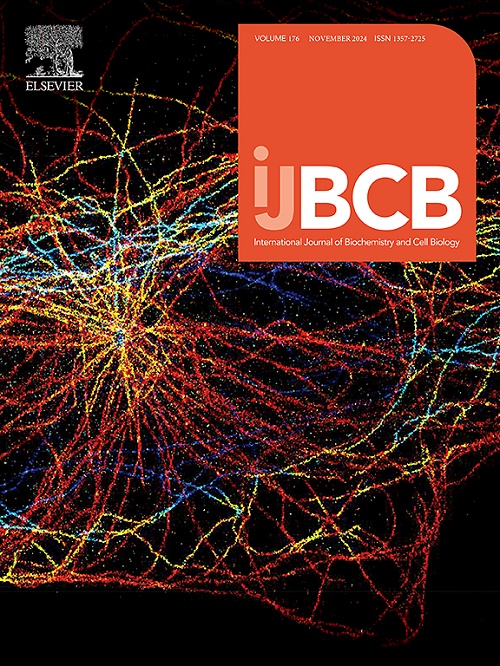综合应激反应上调线粒体 SLC1A5var 可增强体外人类乳腺癌细胞对葡萄糖的依赖性。
IF 2.8
3区 生物学
Q2 BIOCHEMISTRY & MOLECULAR BIOLOGY
International Journal of Biochemistry & Cell Biology
Pub Date : 2024-11-04
DOI:10.1016/j.biocel.2024.106688
引用次数: 0
摘要
乳腺癌是女性中最常见的癌症。三阴性乳腺癌(TNBC)细胞的生长依赖于葡萄糖。综合应激反应(ISR)是细胞对葡萄糖耗竭的应激反应。在葡萄糖耗竭时,ISR-溶质运载家族 7 成员 11 通路被激活,并通过降低细胞内谷氨酸水平来促进葡萄糖依赖性。溶质运载家族 1 成员 5(SLC1A5)和线粒体溶质运载家族 1 成员 5 变体(SLC1A5var)是谷氨酰胺转运体,在癌症代谢重编程中发挥着重要作用。然而,ISR 是否能调节线粒体 SLC1A5var 的表达并进一步影响葡萄糖依赖性仍不清楚。葡萄糖耗竭、低聚霉素和柳氮磺胺吡啶激活的活化转录因子-4(ATF4)诱导了SLC1A5var的表达。ATF4 与 SLC1A5var 启动子中的特定调控元件结合,因此对 SLC1A5var 的调控至关重要。在 TNBC 细胞中,SLC1A5var 敲除会减少葡萄糖耗竭诱导的细胞死亡,而 SLC1A5var 过表达则会增加葡萄糖耗竭诱导的细胞死亡。SLC1A5var 敲除会减少癌细胞的增殖、集落形成和迁移,而 SLC1A5var 过表达则会增加细胞的增殖和迁移。此外,敲除 SLC1A5var 会降低耗氧率(OCR)和细胞外酸化率(ECAR),同时增加葡萄糖耗竭下的最大耗氧率和细胞外酸化率。这些结果表明,活化的 ISR 诱导的 SLC1A5var 表达增加可能会调节线粒体氧化磷酸化和糖酵解代谢特性,从而增强葡萄糖耗竭诱导的细胞死亡。总之,SLC1A5var 在代谢重编程中发挥着重要作用,可能是乳腺癌治疗的潜在靶点。本文章由计算机程序翻译,如有差异,请以英文原文为准。
Integrated stress response-upregulated mitochondrial SLC1A5var enhances glucose dependency in human breast cancer cells in vitro
Breast cancer is the most commonly diagnosed cancer among women. The growth of triple-negative breast cancer (TNBC) cells is glucose-dependent. The integrated stress response (ISR) is a cellular stress response to glucose depletion. The ISR-solute carrier family 7 member 11 pathway is activated during glucose depletion and contributes to glucose dependence by decreasing intracellular glutamate levels. Solute carrier family 1 member 5 (SLC1A5) and the mitochondrial solute carrier family 1 member 5 variant (SLC1A5var) are glutamine transporters that play essential roles in the reprogramming of cancer metabolism. However, whether ISR can regulate mitochondrial SLC1A5var expression and further affect glucose dependence remains unclear. Glucose depletion-, oligomycin-, and salubrinal-activated activating transcription factor-4 (ATF4) induced SLC1A5var expression. ATF4 is critical for SLC1A5var regulation, as it binds to specific regulatory elements in its promoter. SLC1A5var knockdown decreases glucose depletion-induced cell death, whereas SLC1A5var overexpression increases glucose depletion-induced cell death in TNBC cells. SLC1A5var knockdown reduced cancer cell proliferation, colony formation, and migration, whereas SLC1A5var overexpression increased cell proliferation and migration. Moreover, the knockdown of SLC1A5var reduces the oxygen consumption rate (OCR) and extracellular acidification rate (ECAR) while increasing the maximal OCR and ECAR under glucose depletion. These results suggest that activated ISR-induced increased expression of SLC1A5var may regulate mitochondrial oxidative phosphorylation and glycolytic metabolic characteristics to enhance glucose depletion-induced cell death. In conclusion, SLC1A5var plays a vital role in metabolic reprogramming and may be a potential target for breast cancer treatment.
求助全文
通过发布文献求助,成功后即可免费获取论文全文。
去求助
来源期刊
CiteScore
8.10
自引率
0.00%
发文量
124
审稿时长
19 days
期刊介绍:
IJBCB publishes original research articles, invited reviews and in-focus articles in all areas of cell and molecular biology and biomedical research.
Topics of interest include, but are not limited to:
-Mechanistic studies of cells, cell organelles, sub-cellular molecular pathways and metabolism
-Novel insights into disease pathogenesis
-Nanotechnology with implication to biological and medical processes
-Genomics and bioinformatics

 求助内容:
求助内容: 应助结果提醒方式:
应助结果提醒方式:


